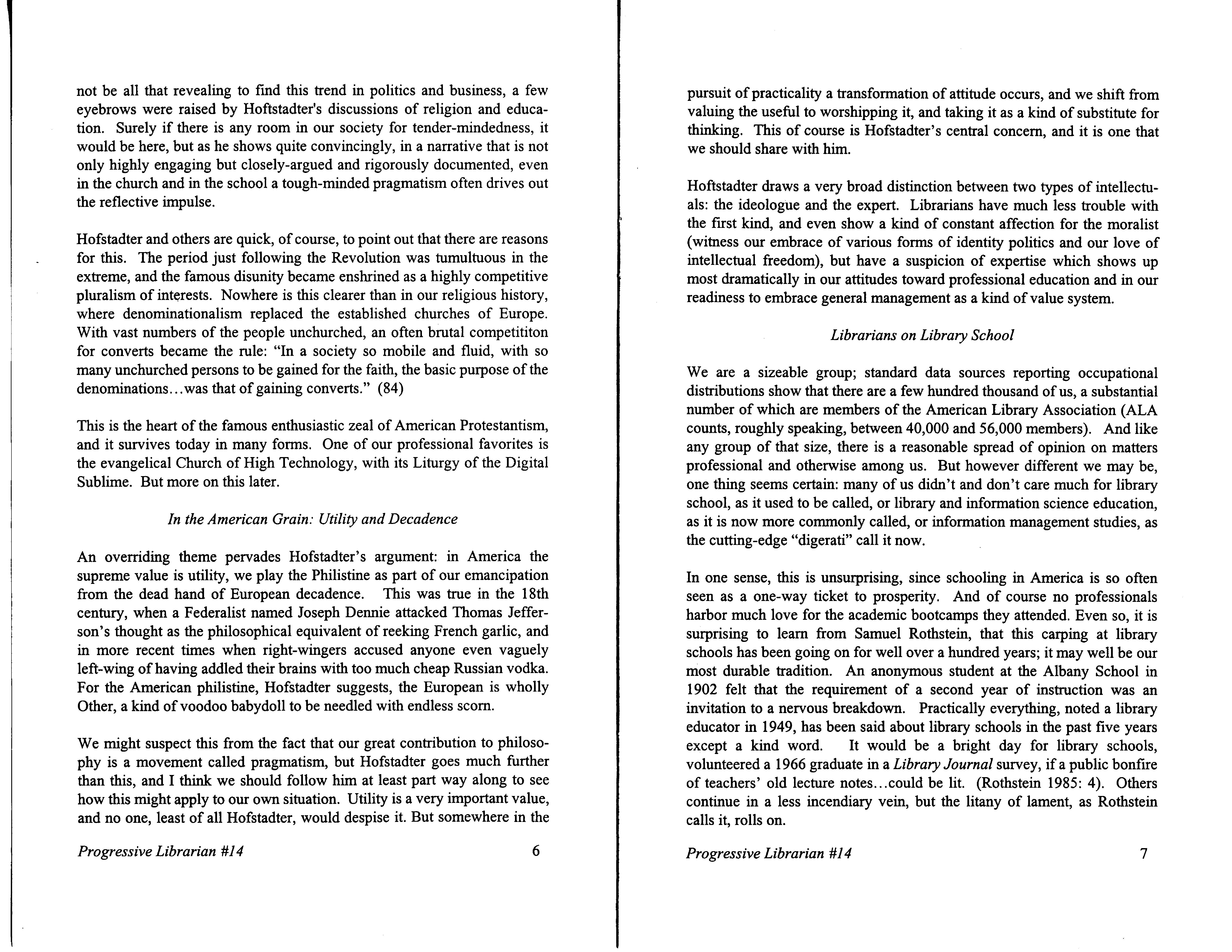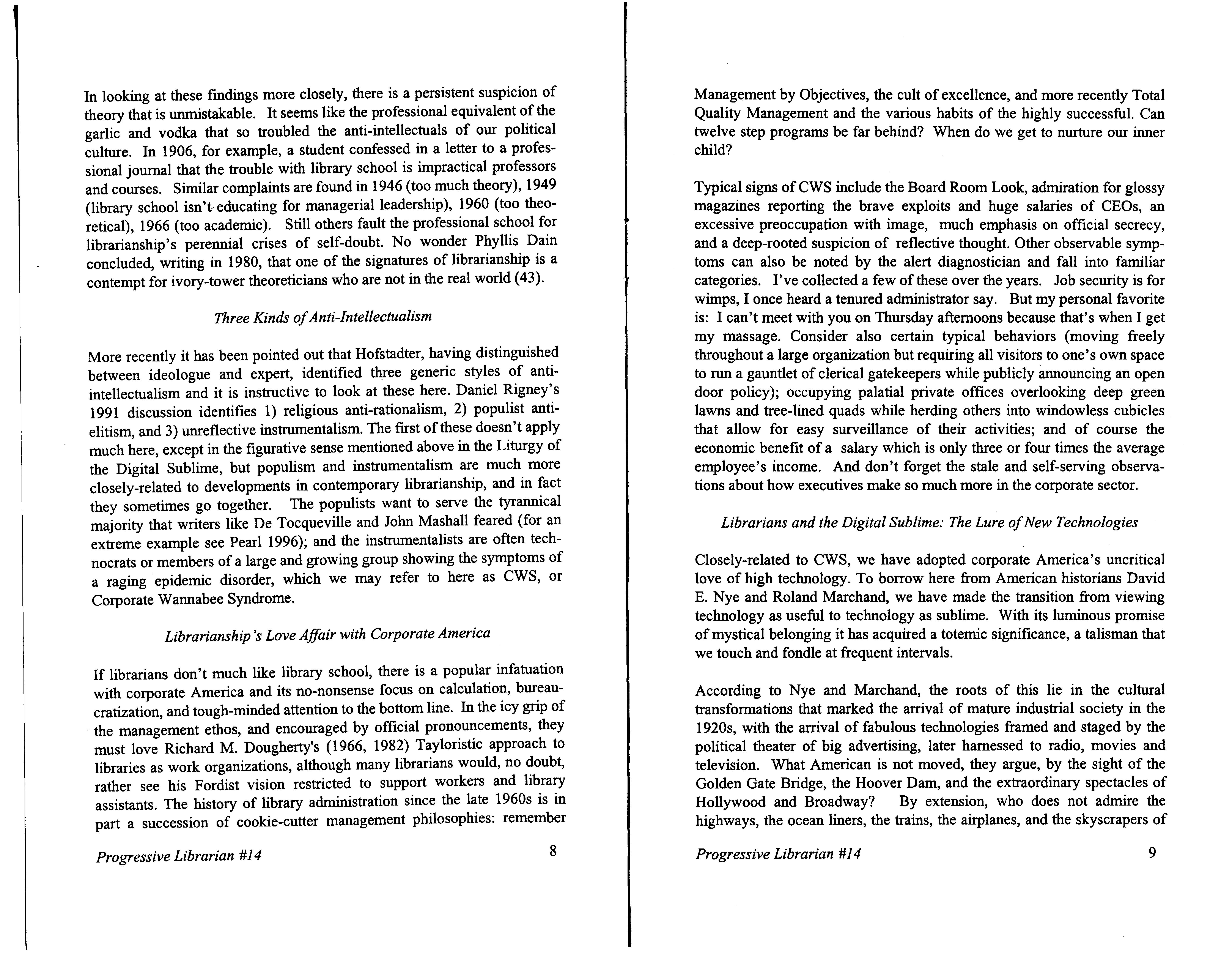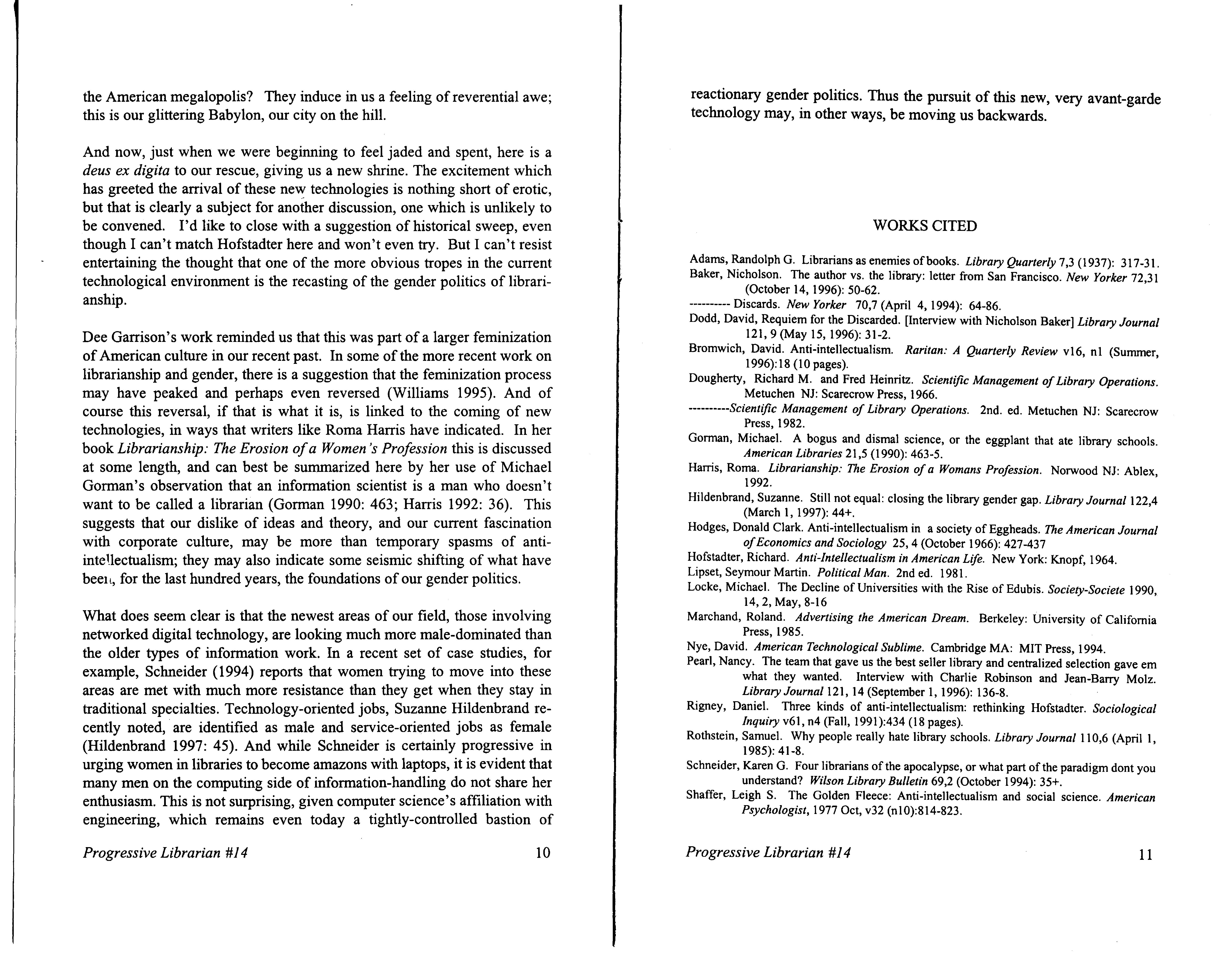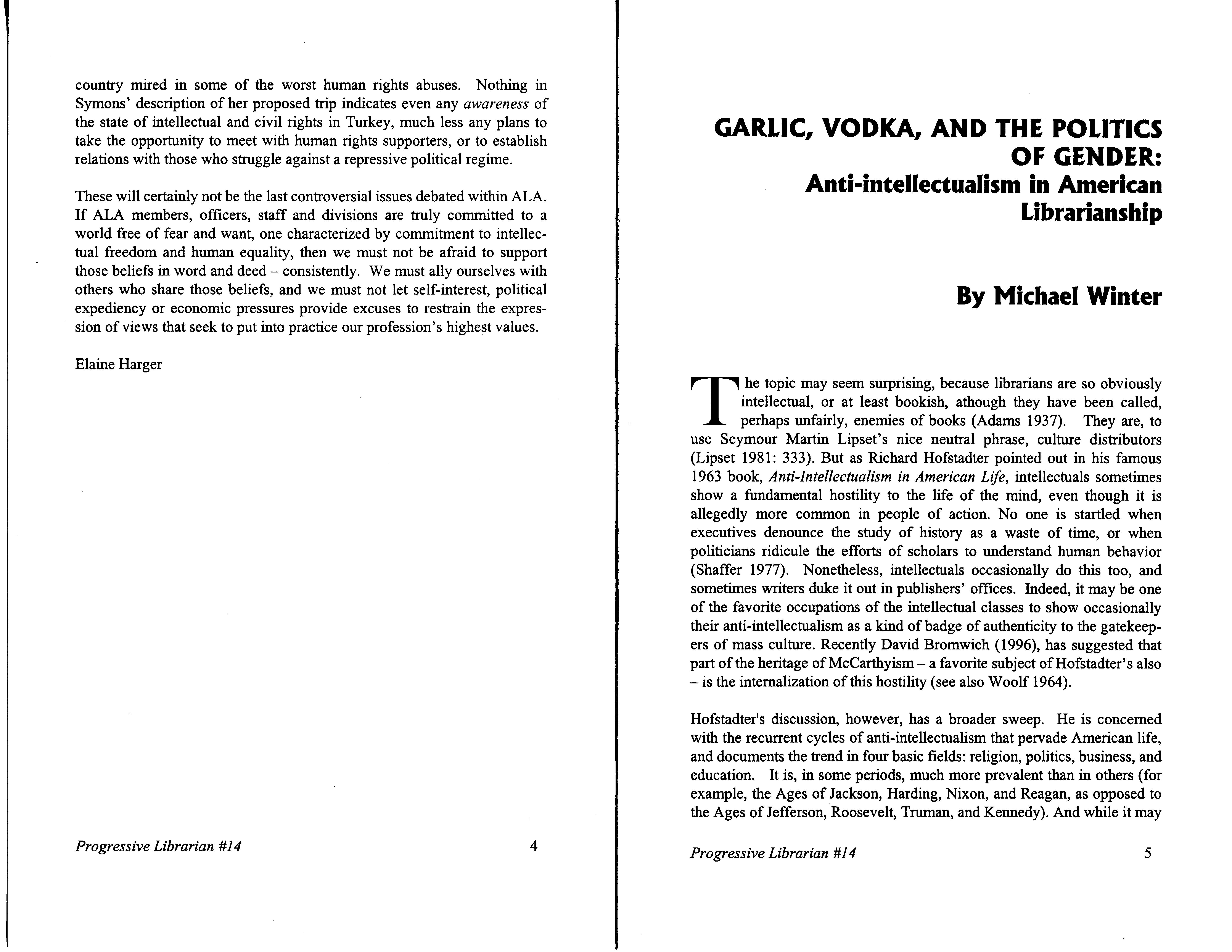GARLIC, VODKA, AND THEPOLITICS OF GENDER: Anti-intellectualism in American Librarianship
TBy Michael Winter
hetopicmay seem surprising, because librarians areso obviously intellectual, oratleast bookish, athough theyhave been called, perhaps unfairly, enemies of books (Adams 1937). They are,to use Seymour Martin Lipset's nice neutral phrase, culture distributors (Lipset 1981:333).Butas Richard Hofstadter pointed outinhisfamous 1963 book, Anti-Intellectualism inAmericanLife, intellectuals sometimes show a fundamental hostility tothelife of themind, even though itis allegedly more common in people of action.Nooneis startled when executives denounce the study of history asawaste of time,or when politicians ridicule the efforts of scholars to understand human behavior (Shaffer 1977). Nonetheless, intellectuals occasionally dothistoo,and sometimes writers dukeitoutin publishers' offices. Indeed, it may beone of the favorite occupations of the intellectual classes to show occasionally their anti-intellectualism asa kind of badge of authenticity tothe gatekeepers of mass culture. Recently David Bromwich (1996), has suggested that part of the heritage of McCarthyism -afavorite subject of Hofstadter's also -isthe internalization of this hostility (seealso Woolf 1964).
Hofstadter's discussion, however, hasa broader sweep.Heis concerned with the recurrent cycles of anti-intellectualism that pervade American life, and documents the trend infour basic fields: religion, politics, business, and education. It is,in some periods, much more prevalent thanin others (for example, theAges of Jackson, Harding, Nixon, and Reagan, as opposed to the Ages of Jefferson, 'Roosevelt, Truman, and Kennedy). And while it may
Progressive Librarian #14 4 Progressive Librarian #14 5

notbeallthat revealing tofindthis trend in politics and business, afew eyebrows were raised by Hoftstadter's discussions of religion and education. Surely if thereisany room in our society for tender-mindedness, it would behere, but asheshowsquite convincingly, ina narrative thatisnot only highly engaging but closely-argued and rigorously documented, even inthe church andinthe school a tough-minded pragmatism often drivesout the reflective impulse.
Hofstadter and others arequick, of course, to point outthatthereare reasons forthis.The period just following the Revolution was tumultuous inthe extreme, andthefamous disunity became enshrined asa highly competitive pluralism of interests. Nowhere isthis clearer thaninour religious history, where denominationalism replaced the established churches of Europe. With vast numbers of the people unchurched, an often brutal competititon for converts became therule: "In a society so mobile andfluid,withso many unchurched persons tobe gained forthefaith,the basic purpose of the denominations ... wasthat of gaining converts." (84)
Thisisthe heart of thefamous enthusiastic zeal of American Protestantism, and it survives today in many forms.One of our professional favorites is the evangelical Church of High Technology, withits Liturgy of the Digital Sublime. Butmoreonthislater.
Inthe American Grain:Utilityand Decadence
An overriding theme pervades Hofstadter's argument: in America the supreme value is utility, we play the Philistine as part of our emancipation from the dead hand of European decadence. Thiswastrueinthe18th century, when a Federalist named Joseph Dennie attacked Thomas Jefferson's thought asthe philosophical equivalent of reeking French garlic, and in more recent times when right-wingers accused anyone even vaguely left-wing of having addled their brains with too much cheap Russian vodka. Forthe American philistine, Hofstadter suggests, the European is wholly Other, a kind of voodoo babydoll tobe needled with endless scorn.
We might suspect thisfromthefactthatour greatcontribution to philosophy isa movement called pragmatism, but Hofstadter goes much further than this,andI think we should follow him atleast part way along tosee how this might apply toourown situation. Utility isavery important value, andnoone, least of all Hofstadter, would despiseit.But somewhere inthe
pursuit of practicality a transformation of attitude occurs, andweshift from valuing the useful to worshipping it,and taking itasakind of substitute for thinking. This of course is Hofstadter's central concern, anditisonethat we should share with him.
Hoftstadter draws a very broad distinction between twotypes of intellectuals:the ideologue andtheexpert. Librarians have much less trouble with thefirstkind,andeven show a kind of constant affection forthe moralist (witness our embrace of various forms of identity politics andourlove of intellectual freedom), but have a suspicion of expertise which shows up most dramatically in our attitudes toward professional education andin our readiness to embrace general management asa kind of value system.
Librarians on Library School
Wearea sizeable group; standard data sources reporting occupational distributions show thatthereareafew hundred thousand of us,a substantial number of which are members of the American LibraryAssociation (ALA counts, roughly speaking, between 40,000 and 56,000 members). And like any group of thatsize,thereisa reasonable spread of opinion on matters professional and otherwise among us.But however different we may be, one thing seems certain: many of us didn't and don't care much for library school, asit used tobecalled,or library and information science education, asitis now more commonly called, or information management studies, as the cutting-edge "digerati" callitnow.
Inonesense,thisis unsurprising, since schooling in America isso often seenasa one-way ticket to prosperity. And of course no professionals harbor much loveforthe academic bootcamps they attended. Even so,itis surprising to learn from Samuel Rothstein, thatthis carping at library schools has been goingonfor well over a hundred years;it may wellbeour most durable tradition. An anonymous student atthe Albany School in 1902feltthatthe requirement of a second year of instruction wasan invitation toa nervous breakdown. Practically everything, noted a library educator in1949,has been said about library schools inthe past fiveyears except a kind word.It would bea bright dayfor library schools, volunteered a1966 graduate ina Library Journal survey, if a public bonfire of teachers' old lecture notes ... could belit. (Rothstein 1985:4). Others continue inaless incendiary vein, but the litany of lament, as Rothstein callsit,rollson.
Progressive Librarian #14 6 Progressive Librarian #14 7

Inlookingatthesefindingsmoreclosely,thereisa persistent suspicion of theorythatis unmistakable. It seemslikethe professional equivalent of the garlicand vodka thatso troubled the anti-intellectuals of our political culture.In1906,forexample,astudent confessed inalettertoa professional journal thatthetroublewithlibraryschoolis impractical professors andcourses.Similarcomplaintsarefoundin1946(toomuchtheory),1949 (library school isn't- educatingfor managerial leadership), 1960(tootheoretical),1966(tooacademic).Stillothersfaultthe professional schoolfor librarianship's perennial crises of self-doubt.NowonderPhyllisDain concluded, writingin1980,thatone of thesignatures of librarianship isa contempt for ivory-tower theoreticians whoarenotintherealworld(43).
ThreeKinds of Anti-Intellectualism
Morerecentlyithasbeen pointed outthatHofstadter,having distinguished between ideologue andexpert, identified threegenericstyles of antiintellectualism anditisinstructivetolookatthesehere.Daniel Rigney's 1991 discussion identifies1)religious anti-rationalism, 2) populist antielitism,and3) unreflective instrumentalism. Thefirst of these doesn't apply muchhere,exceptinthefigurativesense mentioned aboveintheLiturgy of the Digital Sublime,but populism and instrumentalism are much more closely-related to developments in contemporary librarianship, andinfact they sometimes gotogether.The populists wanttoservethe tyrannical majority thatwriterslikeDe Tocqueville andJohnMashallfeared(foran extremeexampleseePearl1996);andthe instrumentalists areoftentechnocratsor members of alargeandgrowinggroupshowingthesymptoms of araging epidemic disorder,whichwemayrefertohereasCWS,or Corporate Wannabee Syndrome.
Librarianship's Love Affair with Corporate America
If librarians don't muchlikelibraryschool,thereisa popular infatuation with corporate America andits no-nonsense focusoncalculation, bureaucratization, and tough-minded attention tothe bottom line.Intheicygrip of ,the management ethos,and encouraged byofficial pronouncements, they mustlove Richard M. Dougherty's (1966,1982) Tayloristic approach to librariesaswork organizations, although manylibrarianswould,nodoubt, ratherseehisFordistvision restricted tosupportworkersandlibrary assistants.Thehistory of library administration sincethelate1960sisin parta succession of cookie-cutter management philosophies: remember
Management byObjectives,thecult of excellence,andmore recently Total Quality Management andthevarioushabits of thehighlysuccessful.Can twelvestep programs befar behind? Whendowegettonurtureourinner child?
Typical signs of CWSincludetheBoardRoomLook, admiration forglossy magazines reportingthebraveexploitsandhugesalaries of CEOs,an excessive preoccupation withimage,muchemphasisonofficialsecrecy, anda deep-rooted suspicion of reflectivethought.Other observable symptomscanalsobenotedbythealert diagnostician andfallintofamiliar categories. I've collected afew of theseovertheyears.Jobsecurityisfor wimps,Ioncehearda tenured administrator say.Butmy personal favorite is:I can't meetwithyouon Thursday afternoonsbecause that's whenIget my massage. Consider also certain typical behaviors (moving freely throughout alarge organization butrequiringallvisitorsto one's ownspace toruna gauntlet of clerical gatekeepers while publicly announcing anopen door policy); occupying palatial privateoffices overlooking deepgreen lawnsand tree-lined quadswhileherdingothersinto windowless cubicles thatallowforeasy surveillance of theiractivities;and of coursethe economic benefit of asalarywhichisonlythreeorfourtimestheaverage employee's income.And don't forgetthestaleand self-serving observationsabouthowexecutivesmakesomuchmoreinthe corporate sector.
Librarians and the Digital Sublime:TheLure of
New Technologies
Closely-related toCWS,wehaveadoptedcorporate America's uncritical love of high technology. To borrow herefrom American historiansDavid E.NyeandRolandMarchand,wehavemadethe transition fromviewing technology asusefulto technology assublime.Withitsluminous promise of mystical belonging ithas acquired atotemicsignificance,a talisman that we touch andfondleatfrequentintervals.
According to Nye andMarchand,theroots of thislieinthecultural transformations that marked thearrival of matureindustrialsocietyinthe 1920s,withthearrival of fabulous technologies framedandstagedbythe political theater of bigadvertising,later harnessed toradio,moviesand television.What American isnotmoved,theyargue,bythesight of the GoldenGateBridge,the Hoover Dam,andthe extraordinary spectacles of Hollywood and Broadway? Byextension,whodoesnotadmirethe highways,theoceanliners,thetrains,theairplanes,andthe skyscrapers of
Progressive Librarian #14 8 Progressive Librarian #14 9
theAmericanmegalopolis?Theyinduceinusafeelingofreverentialawe; thisisourglitteringBabylon,ourcityonthehill.
Andnow,justwhenwewerebeginningtofeeljadedandspent,hereisa deusexdigita toourrescue,givingusanewshrine.Theexcitementwhich hasgreetedthearrivalofthesenewtechnologiesisnothingshort of erotic, butthatisclearlyasubjectforanotherdiscussion,onewhichisunlikelyto beconvened. I'd liketoclosewithasuggestion of historicalsweep,even thoughI can't matchHofstadterhereand won't eventry.But I can't resist entertainingthethoughtthatoneofthemoreobvioustropesinthecurrent technologicalenvironmentistherecasting of thegenderpolitics of librarianship.
Dee Garrison's workremindedusthatthiswaspart of alargerfeminization of Americancultureinourrecentpast.Insome of themorerecentworkon librarianshipandgender,thereisasuggestionthatthefeminizationprocess mayhavepeakedandperhapsevenreversed(Williams1995).And of coursethisreversal,ifthatiswhatitis,islinkedtothecomingofnew technologies,inwaysthatwriterslikeRomaHarrishaveindicated.Inher book Librarianship: TheErosion of aWomen'sProfession thisisdiscussed atsomelength,andcanbestbesummarizedherebyheruseofMichael Gorman's observationthataninformationscientistisamanwho doesn't wanttobecalledalibrarian(Gorman1990:463;Harris1992:36).This suggeststhatourdislikeofideasandtheory,andourcurrentfascination withcorporateculture,maybemorethantemporaryspasms of antiintellectualism;theymayalsoindicatesomeseismicshifting of whathave been,forthelasthundredyears,thefoundations of ourgenderpolitics.
Whatdoesseemclearisthatthenewestareas of ourfield,thoseinvolving networkeddigitaltechnology,arelookingmuchmoremale-dominatedthan theoldertypes of informationwork.Inarecentset of casestudies,for example,Schneider(1994)reportsthatwomentryingtomoveintothese areasaremetwithmuchmoreresistancethantheygetwhentheystayin traditionalspecialties. Technology-oriented jobs,SuzanneHildenbrandrecentlynoted,areidentifiedasmaleandservice-orientedjobsasfemale (Hildenbrand1997:45).AndwhileSchneideriscertainlyprogressivein urgingwomeninlibrariestobecomeamazonswithlaptops,itisevidentthat manymenonthecomputingside of information-handlingdonotshareher enthusiasm.Thisisnotsurprising,givencomputer science's affiliationwith engineering,whichremainseventodayatightly-controlledbastionof
reactionarygenderpolitics.Thusthepursuit of thisnew,veryavant-garde technologymay,inotherways,bemovingusbackwards.

WORKSCITED
Adams,RandolphG.Librariansasenemiesofbooks. LibraryQuarterly 7,3(1937):317-31. Baker,Nicholson.Theauthorvs.thelibrary:letterfromSanFrancisco. NewYorker72,31 (October14,1996):50-62.
----------Discards. NewYorker 70,7(April4,1994):64-86.
Dodd,David,RequiemfortheDiscarded.[InterviewwithNicholsonBaker] Library Journal 121,9 (May15,1996):31-2.
Bromwich,David.Anti-intellectualism. Raritan:AQuarterlyReview v16,nl(Summer, 1996):18(10pages).
Dougherty,RichardM.andFredHeinritz. Scientijic Management of LibraryOperations. MetuchenNJ:ScarecrowPress,1966.
----------Scientijic Management of LibraryOperations. 2nd.ed.MetuchenNJ:Scarecrow Press,1982.
Gorman,Michael.Abogusanddismalscience,ortheeggplantthatatelibraryschools. AmericanLibraries 21,5(1990):463-5.
Harris,Roma. Librarianship: TheErosion of aWomansProfession. NorwoodNJ:Ablex, 1992.
Hildenbrand,Suzanne.Stillnotequal:closingthelibrarygendergap. Library Journal 122,4 (March1,1997):44+.
Hodges,DonaldClark. Anti-intellectualism inasocietyofEggheads. TheAmericanJournal of EconomicsandSociology 25,4 (October1966):427-437
Hofstadter,Richard. Anti-Intellectualism inAmericanLife. NewYork:Knopf,1964. Lipset,SeymourMartin. Political Man. 2nded.1981.
Locke,Michael.TheDeclineofUniversitieswiththeRiseofEdubis. Society-Societe 1990, 14,2, May,8-16
Marchand,Roland. Advertising theAmericanDream. Berkeley:UniversityofCalifornia Press,1985.
Nye,David. AmericanTechnologicalSublime. CambridgeMA:MITPress,1994. Pearl,Nancy.Theteamthatgaveusthebestsellerlibraryandcentralizedselectiongaveem whattheywanted.InterviewwithCharlieRobinsonandJean-BarryMolz. LibraryJournal 121,14(September1,1996):136-8.
Rigney,Daniel.Threekindsofanti-intellectualism:rethinkingHofstadter. Sociological Inquiry v61,n4(Fall,1991):434(18pages).
Rothstein,Samuel.Whypeoplereallyhatelibraryschools. LibraryJournal 110,6(April1, 1985):41-8.
Schneider,KarenG.Fourlibrariansoftheapocalypse,orwhatpartoftheparadigmdontyou understand? WilsonLibraryBulletin 69,2(October1994):35+.
Shaffer,LeighS.TheGoldenFleece:Anti-intellectualismandsocialscience. American Psychologist, 1977Oct,v32 (nl0):814-823.
Progressive Librarian#14 10 Progressive Librarian#14 11
Tisdale,Sallie.Silence,please:thepubliclibraryas entertainment center. HarpersMagazine 294,1762(March1997):65-74.
White,Morton.Reflectionson anti-intellectualism. Daedalus 91,3(Summer1962):457468.
Williams, Christine L. StillaMansWorld:MenWhoDoWomensWork. Berkeley: University of California Press,1995.
Wolff,KurtH.Theenemywithin: anti-intellectualism. TheCentennialReview 7,1(Winter 1964):46-63.






